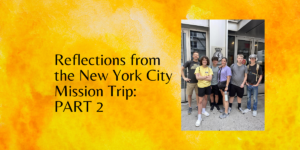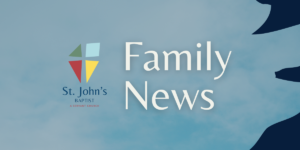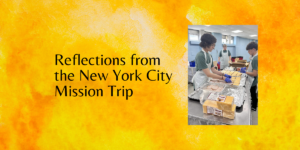From the Heritage Room—
St. John’s and “The Lost Boys of Sudan”
In church on Sunday, Phillips Bragg spoke about our support of the Nyarweng School in South Sudan. The following article (here in shortened form) is by Nina Phillips.
In 2001 many of us at St. John’s knew very little about the African country of Sudan or about the fact that the country had been torn by civil wars for much of its history and that for the past many years a brutal civil war had been raging between the arid, mostly Muslim, north and the south where the people practiced Christianity and local religions, and where natural resources divided the country. We also did not know that many thousands of the children of the south had been separated from their families and had grown up in refugee camps, first in Ethiopia and finally in Kenya where they attended UN sponsored schools and had to take turns using the few available textbooks, and where on some days there was no food because food supplies to the camp had been confiscated from trucks making deliveries. There were many thousands of these children who grew up with no hope of being able to return to their home villages, where whatever remained of their families still lived under the shadow of continuing war.
National media, including PBS and CBS, had begun producing documentaries detailing the stories of these youth and reporting the that The United Nations High Commission on Refugees had contracted with countries around the world to accept a portion of them as refugees. The United States State Department agreed to accept about 4000 of these youth, with around 40 of them coming to Charlotte under the sponsorship of Catholic Social Services. The young men became internationally known as The Lost Boys of Sudan.
In mid-2001 Martha Kearse, a member of St. John’s and soon to be our Minister to Children, was shopping for groceries and noticed some very tall and very dark young men appearing to need help in their shopping. Martha introduced herself, offered some help in their selection of food, gave them her card with her telephone number, and invited them to call if she could help in any way.
With Martha’s card in hand, the young men from the grocery store called. A flurry of response ensued as Martha involved friend and fellow church member, Maggie Bond. St. John’s members responded with help on the needs we observed, as the young men began appearing in our worship services, transported to St. John’s by Dana Packman in the church van. We learned through Catholic Social Services that the agency provided services of securing housing, social security cards, and jobs for the new refugees, and helped with basic clothing and household necessities, along with a general orientation to the new and different culture in which they found themselves. However, this CSS services ceased after 90 days, when the agency had to move along to serve other newly arriving refugees.
While our involvement initially revolved around providing clothing and household items, we soon found ourselves making friends with the smiling, engaging young men who joined us in our worship services. Church members volunteered to lead Sunday morning orientation sessions prior to worship services, covering a range of topics as cooking and shopping, healthcare and hygiene, laws, insurance, and a host of other topics to help in their adjustment here.
Associate Minister Blythe Taylor used her skills in organization to give some structure to the widespread response from the St. John’s members. Blythe visualized a mentoring program to give members an opportunity to develop a special relationship with individuals or small groups of the young men. Caroletta Partain, a member at the time, provided leadership for this mentoring program, including training sessions and ongoing support for mentors and others who wanted to form a special bond with our new friends.
Over 40 St. John’s members served as mentors or otherwise provided regular, ongoing support and friendship and at least 8 people from other churches joined with our mentoring program. Many of the bonds formed remain strong 20 years later. We learned much from these new African friends about their culture and customs, about their experiences growing up, and about the history of their country. We followed them as they struggled to send relief to relatives and friends still there who continued to suffer from hunger, limited medical services, and little education. We were inspired by their positive outlook on life, in spite of the tragedies of their growing up and their continued concerns about their homeland. We learned about the ongoing civil war, which finally resulted in a ceasefire and in 2011, ultimate independence for South Sudan.
One by one they completed their high school work at Central Piedmont Community College and as many of them graduated from college. They were able to reconnect with families with whom they had lost all connections and, in some cases, became aware of relatives and friends who had not survived because of continued unrest or because of lack of proper medical care.
As the bond between St. John’s members and the young men strengthened, mentors compared experiences and learned from each other; staff and lay people interacted frequently throughout the journey. Attorneys provided legal advice and intervention. Homemakers cooked and baked. Mothers tutored, drove the men to doctor’s appointments, and gave laundry and shopping tips; some offered driving lessons and driving practice and advised on car purchases and repairs. Youth offered friendship and fun times at social gatherings. There was computer instruction, resume writing and career exploration and more. Whole families shared meals and outings.
Lubo Mijak, who had been paired in the mentoring program with Phillips and Leslie Bragg and their family, and who had graduated from UNCC in 2008, made a trip to South Sudan, where he visited his home village and found educational opportunity almost non-existent. He had taken with him some pencils, and discovered he had to break the pencils to make enough to share with all the students who came to learn something in the class he set up under a tree, with a broken blackboard tacked to the tree as his only teaching tool. Lubo told the people he would return to the United States and begin to implement a plan to come back and build a school in that village.
When Lubo returned to Charlotte, he approached the Braggs about his dream. Over a period of months and years a plan, with the help of Mothering Across Continents, began to emerge. Lubo spoke at numerous gatherings across the area and Phillips and others arranged a multitude of fund raising events throughout our area, including Rations of Hope, meals at which participants were provided a simple meal of beans and bread as a way to promote understanding of the past experiences of our Sudanese friends and an understanding of the limited resources still affecting the lives of the people there.
Plans came together so that by 2012 the Nyarweng Primary School in South Sudan became a reality. Initially support from the families in South Sudan was minimal but as the families there began to see what it meant to the children and to the future of their community the support by the local families has increased.
In 2013 both Phillips Bragg and Martha Kearse made separate trips to the school. These visits served as a beginning of a partnership between the people of the Nyarweng community in South Sudan and supporters here. Reports of those visits gave us a firsthand look at the school and a beginning of an engagement between the people of St. John’s and the families of the Nyarweng students. Pre-Covid enrollment at the school had reached over 450 students. At the beginning of 2022 enrollment was 325 students, the decline due to a shutdown during the pandemic.
For the past several years St. John’s, through our Global Mission Offering, has provided $20,000 each year for teacher salaries and training. St. John’s annual contributions exceed 50% of the operating budgets of the Nyarweng School and Gumriak School, a partner school in the area. We have continued as a church through our Mission Resource Team budget, as individuals, and through our Global Mission Offering, to contribute toward general ongoing support for Nyarweng Primary School in South Sudan, helping to further the fulfillment of the dream of one the Lost Boys whom we first met in 2001.









